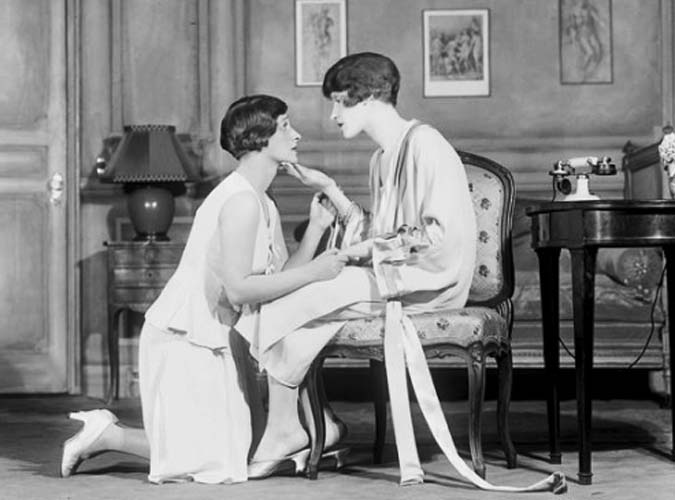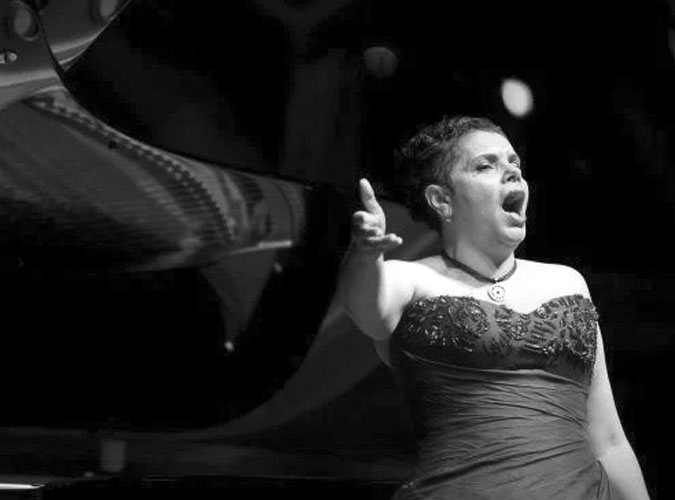Lesbian Plays and Lesbian Operas - Sapphic Theatre History
Queer Theatre Censorship in Theatre History: In the first half of the 20th century, theatre companies (including cast members) could be arrested for staging a gay or lesbian play / portraying a gay / lesbian character in a play. In the 2020s - unfairly in some countries homesexuality is still illegal. So far, I have discovered four plays featuring lesbians which were banned in America:
- 1923 Got Fun Nekome / God of Vengeance (also banned in the UK)
- 1926 - La Prisonnière / The Captive
- 1944 - Trio
- 1999 - Life Versus the Paperback Romance
Why the drama regarding Lesbian plays?
......
American Theatre 1926 to 1967: The Wales Padlock Law
In 1926 New York State passed the Wales Padlock Law, which prohibited plays “depicting or dealing with the subject of sex degeneracy or perversion”. New York State theaters which broke the Wales Padlock Law could be closed. Although the New York law was not often enforced, and was protested by the theatre community, it had a huge and censorious effect on the Broadway stage. Despite the law, which remained until 1967, ambiguous lesbian and gay characters did manage to make it to Broadway. The lesbian drama Trio performed at the Belasco Theatre was the last Broadway show impacted by the Wales Padlock Law. The play was ordered to close by New York License Commissioner Paul Moss who refused to renew the Belasco Theatre's license if "Trio" remained open; it closed on February 24, 1945.
British Theatre 1843 to 1968: Theatres Act of 1843
Up until 1968, British theatre was at the mercy of censorship. Under the Licensing Act of 1737 and the Theatres Act of 1843 all plays intended for public performance had to be approved and licensed by the Lord Chamberlain’s Office, which was a legal requirement. This was to ban anything indecent, offensive or blasphemous being performed in theatres. Theatre censorship was particularly strict on homosexuality and the depiction of gay men and women on stage. The ban was not quite watertight as slick playwrights found ways of hinting at a character’s sexuality that the Lord Chamberlain may not always discern. For example, in stage directions playwrights may have described a male character as ‘sensitive’, ‘artistic’ or ‘flamboyant and female character as "manly", "Greek"... to tip-off directors and actors that a character held homosexual desires.
The publication in 1957 of the Report of the Departmental Committee on Homosexual Offences and Prostitution – better known as the Wolfenden Report recommended that 'homosexual behaviour between consenting adults in private should be no longer a criminal offence'. Following the publication of the Wolfenden Report, the policy towards the censorship of plays featuring gay characters and dealing with homosexual themes was relaxed. One of the first plays to benefit from this new approach was Shelagh Delaney’s A Taste of Honey (1958). In 1967 homosexuality was decriminalised in England and Wales (and 1981 in Scotland, 1982 in Northern Ireland). Finally, The Lord Chamberlain’s Office role of theatre censor was abolished by the Theatres Act 1968 (a year after the American Wales Padlock Law was abolished).
American Movies 1930 to 1966: The Hays Code 1930
In America, The Motion Picture Production Code (a.k.a The Hays Code, named after its creator Will H. Hays), first published in March 1930, introduced film censorship in the US through stating a series of guidelines to film producers. The Hays Code directly influenced the content of almost every American film made between 1930 and 1966, when the Motion Picture Association of America introduced a ratings system.
These were developed into a series of rules: Crimes Against The Law, Sex, Vulgarity, Obscenity, Profanity, Costume, Dances (i.e. suggestive movements), Religion, Locations (i.e. the bedroom), National Feelings, Titles and "Repellent Subjects" (extremely graphic violence).
Apology
Apologies to worldwide slick lesbian plays and lesbian operas not mention herein. I did Google until the cows came home. Interestingly, I found (having seen) far more lezza films than lezza plays :( Groovy budding playwrights, this 2021 with so many resources: the internet for publication, social media for casting calls & marketing, crowdfunding... in bocca al lupo :)
Check out Meghan Brodie Gualtieri's more high brow and informative "Lesbian Broadway: American Theatre and Culture, 1920-1945" PDF.

1651 - The Fragrant Companion (Lesbian Play)
After her honeymoon, a newly married wife goes to a temple in Yangzhou, China to burn joss to the gods. There she meets the fragrant daughter of a Lord. It's L.O.V.E at first sight. The ladies hatch a plan to spend the rest of their lives together... a ménage-à-trois marriage!
The Fragrant Companion is considered as being the most significant work of literature that depicts female same-sex love in the entire premodern Chinese tradition. FYI - Li Yu (1611 – 1680) was.. a man! Li Yu was a Chinese performer, playwright, novelist and publisher who lived in the late Ming and early Qing dynasties. Same-sex love was also featured in Li Yu's tale Cuìyǎ lóu ("House of Gathered Refinements") and in the collection Wúshēng xì ("Silent Operas").
The Fragrant Companion: A drama in ? acts
Playwright: Li Yu
The Fragrant Companion Premiere: ?

1895 - Erdgeist / Earth Spirit (Play)
The chronicles of femme fatale Lulu, Part 1: Lulu's first husband dies of heart attack when he finds her embraced with another man, her second husband kills himself over her sordid past, and her third husband - she murders. Lulu also ensnares the lesbian Countess Geschwitz...
In the original manuscript - Die Büchse der Pandora: Eine Monstretragödie (Pandora's Box: A Monster Tragedy), dating from 1894, the 'Lulu' drama was in five acts. Frank Wedekind's publisher refused to publish the complete manuscript so Wedekind subsequently divided the work into two plays: Erdgeist (Earth Spirit, 1895) and Die Büchse der Pandora (Pandora's Box, 1904).
Erdgeist: A drama in four acts
Playwright: Frank Wedekind
Erdgeist Premiere: Krystallpalast, Leipzig, 1898

1899 - Criss Cross (Play)
Among successful writer Ann admirers are Cecil her young cousin who likes Jack an artist. When Jack comes, Ann gets him to propose to Cecil despite his interest in Anne herself. Who has Ann sacrificed her own love for?
For 1899, surely the quote is not ambiguous "If I were a man, now, it would be so easy. So easy to take her up in my arms and shield her against the whole world".
Rachel Crothers was an American playwright and theatre director and is considered "the most successful and prolific woman dramatist writing in the first part of the twentieth century." She never married.
Criss Cross: A Lesbian play in one act
Playwright: Rachel Crothers
Criss Cross Premiere: ?


































